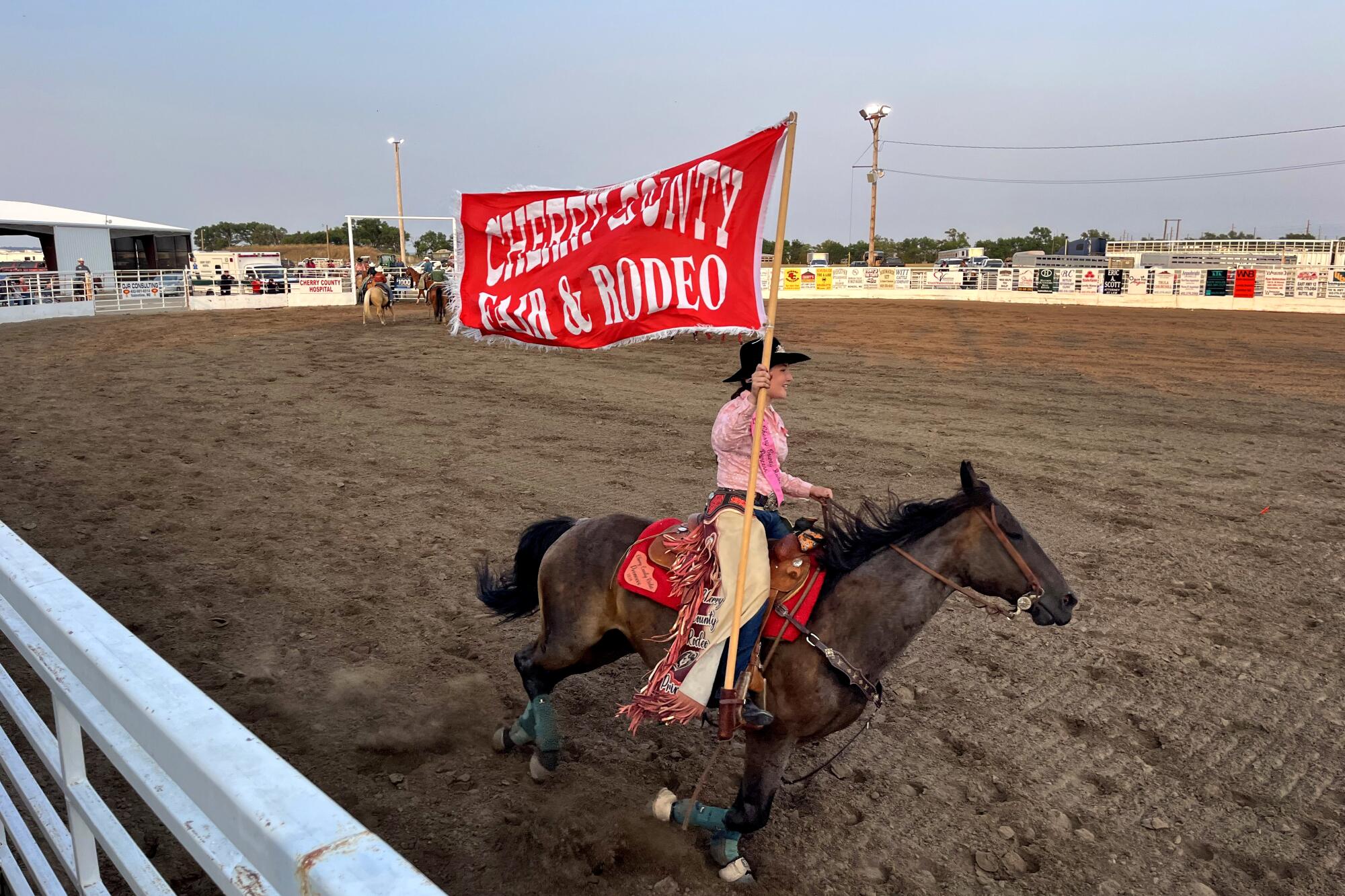
- Share via
VALENTINE, Neb. — Mayor Kyle Arganbright steered his dusty diesel truck through this ranching town, past the rodeo grounds and livestock auction, and pointed out the football field of the Valentine High School Badgers, whose roster once included a teenage Tim Walz. Next up: the quiet, tree-lined street where the Walz family once lived.
After Walz, the Minnesota governor, was named Vice President Kamala Harris’ running mate, reporters descended on his hometown of Valentine, population 2,600.
“Now I’m the local Tim Walz tour guide. Write that on the list of things I never thought I’d do,” Arganbright said with a laugh as a fishing rod, stretching from the back seat, rattled on his dashboard.
Harris and Walz come from vastly different worlds.
Harris is the biracial daughter of immigrants whose career was forged by the rough-and-tumble Democratic politics of the Bay Area — a place nationally synonymous with West Coast liberalism.
Walz is a white guy who spent formative years in Valentine, the remote seat of Cherry County, the nation’s top producer of beef cows.
Walz leans heavily on his upbringing, and during a campaign stop in Los Angeles this week, he even walked onstage to the John Mellencamp song “Small Town.”
But here in Cherry County — where former President Trump won 87% of the vote in 2020 — the presence of a hometown boy on the Democratic ticket is, well, a little awkward.
Asked if Walz might flip many votes, Arganbright chuckled.
“Um, no,” he said.
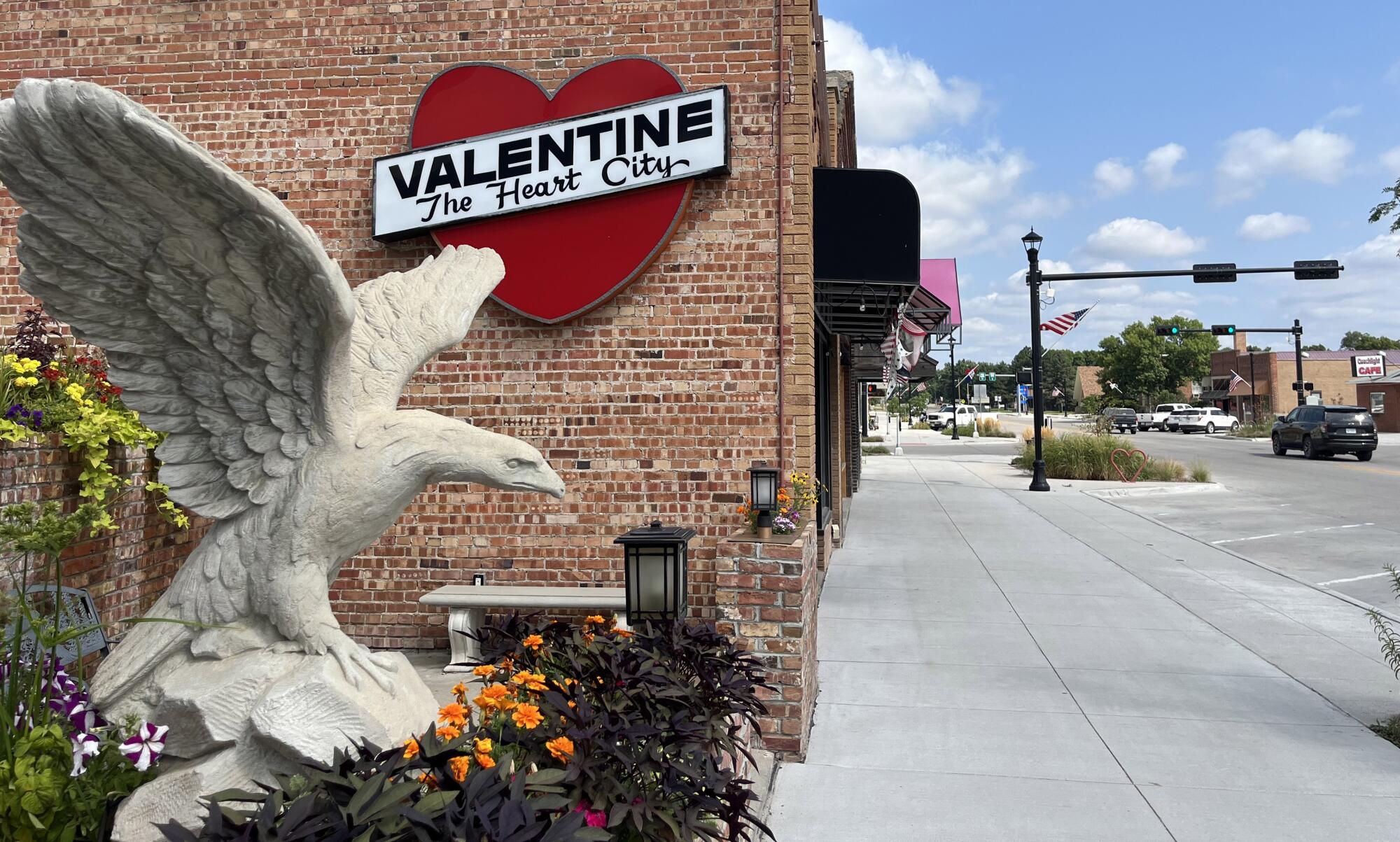
Arganbright, a fifth-generation Valentinian, said most voters here are Republicans with a leave-me-alone libertarian bent.
“If Tim Walz came back, I bet someone would buy him a beer if they saw him and say, ‘Hey, welcome home, man,’” he said. “People are very accommodating. But they’re not going to give up on their principles to impress somebody.”
Arganbright would not say whom he will be voting for — but said it might be a hint of his party preference that he once interned for Nebraska-born former Vice President Dick Cheney and that one of his young nephews had a show steer named Donald.
With Harris tapping Walz and Trump picking as his running mate Ohio Sen. JD Vance — whose bestselling “Hillbilly Elegy” chronicled his impoverished upbringing in the Rust Belt and Appalachia — the race has become, in part, a contest of rural bona fides.
Though the Trump campaign branded Walz “a West Coast wannabe,” Democrats are betting Walz will help them broaden their appeal in overwhelmingly white swaths of rural America, where the party has been trying to claw back voters after two decades of steep losses.
The country’s urban-rural political divide — evident even in California, where conservative northern counties have long talked of seceding to form their own State of Jefferson— has only grown wider since Trump was elected in 2016.
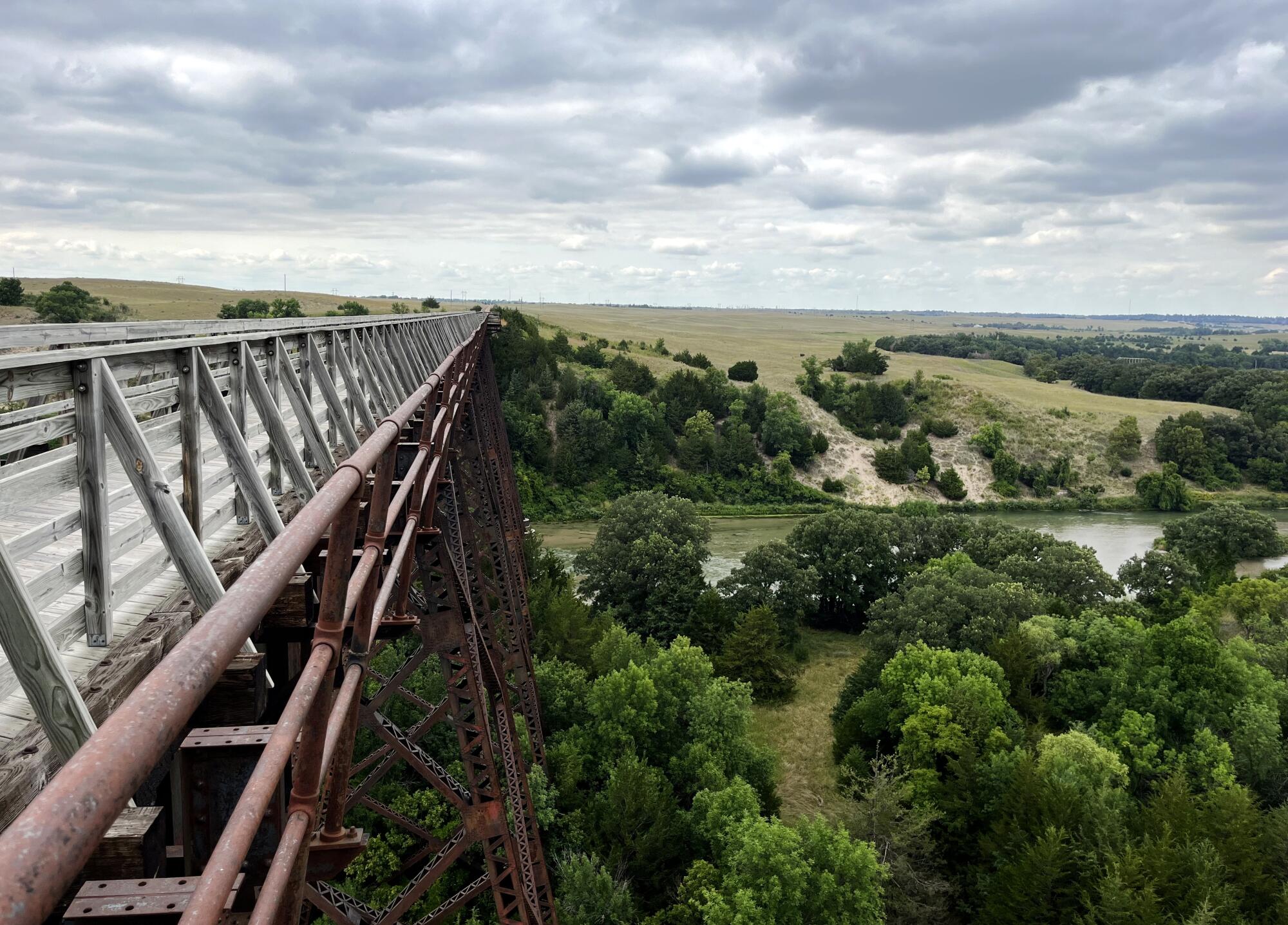
For urban Democrats, “it’s as if rural America has become a throwaway, and that lack of interest morphed into enormous resentment after Trump was elected,” said Lisa Pruitt, a professor at the UC Davis School of Law and president-elect of the Rural Sociological Society.
During the 2022 midterm elections, 69% of rural voters cast ballots for Republicans, compared with 29% supporting Democrats, according to the Pew Research Center. Among urban voters, 68% supported Democrats and 30% backed Republicans.
Randy Adkins, a political scientist at the University of Nebraska Omaha, said he does not see places like Nebraska suddenly going blue.
“What we’re seeing in the polls right now is there’s a little bit of movement toward Harris, but people made hard decisions and they made them a long time ago,” he said.
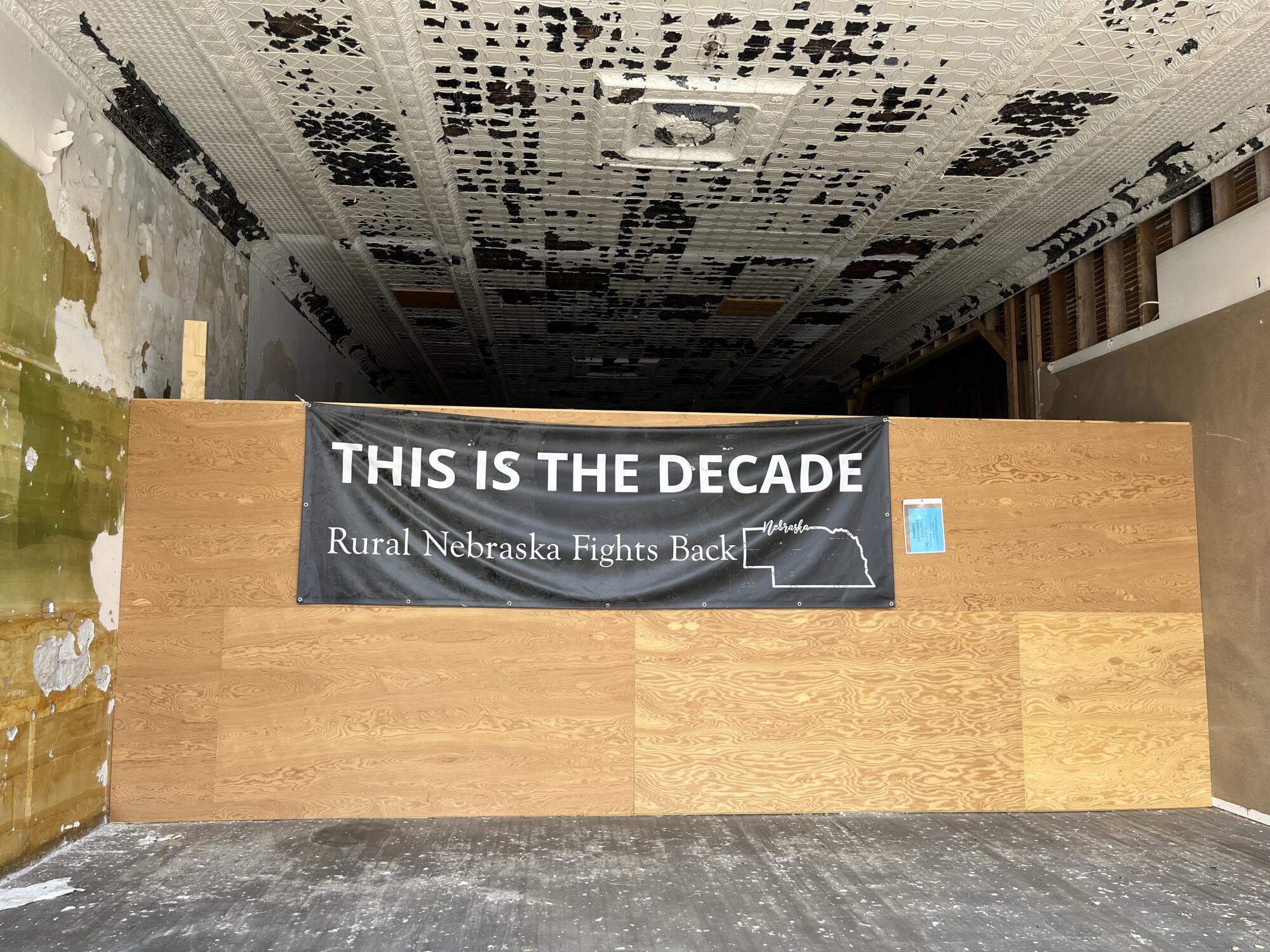
Still, there is palpable excitement among rural Democratic organizers, who say they have long been overlooked by their national party.
Jane Kleeb, chair of the Nebraska Democratic Party, said in an email that Harris “has absolutely expanded the map beyond swing states with Tim Walz” and that “we do not have to hand him a briefing book on rural issues, because he has lived our experiences.”
Among Democrats’ many identity-based Zoom fundraising calls that have raised millions — including “White Dudes for Harris” — was an event last week called “Rural Folks for Harris.” It drew about 6,000 listeners across 48 states and raised $22,000.
In Valentine, there were no visible yard signs for Harris or Trump this week. At the Cherry County Rodeo, people donned cowboy hats, not MAGA caps.
The rodeo clown wondered aloud if one cowboy in a green shirt had actually “gone green” and had an electric pickup truck in the parking lot. It was a wink-wink joke in this far-flung town with no electric vehicle chargers, where such vehicles are seen not only as impractical — it is 130 miles to the nearest Walmart — but as a whiff of liberalism.
Arganbright — whose 7-year-old daughter rode a sheep bareback for just over two seconds in the rodeo’s mutton-bustin’ contest — is amused by the sudden, if fleeting, national interest that Walz’s selection has brought to Valentine. He hopes to use the spotlight to highlight positive things, like the just-finished, multimillion-dollar overhaul of Main Street.
But, he said, there are pressing issues here in vast Cherry County, where the population has dropped nearly 11% since 2000, to roughly 5,500 residents. Residents have struggled with high inflation, job losses as agricultural work becomes more mechanized, and a lack of child care and affordable housing.
As for people’s views of the federal government? One of the best examples, he said, of how “federal policies aren’t taken great locally” is the federally established time zone line, which, until the late 1960s, ran along Main Street, splitting Valentine between Mountain and Central time.
He said it took the government too long to fix it — although some bars are said to have benefited by opening on the west side of town, where they could stay open an hour later.
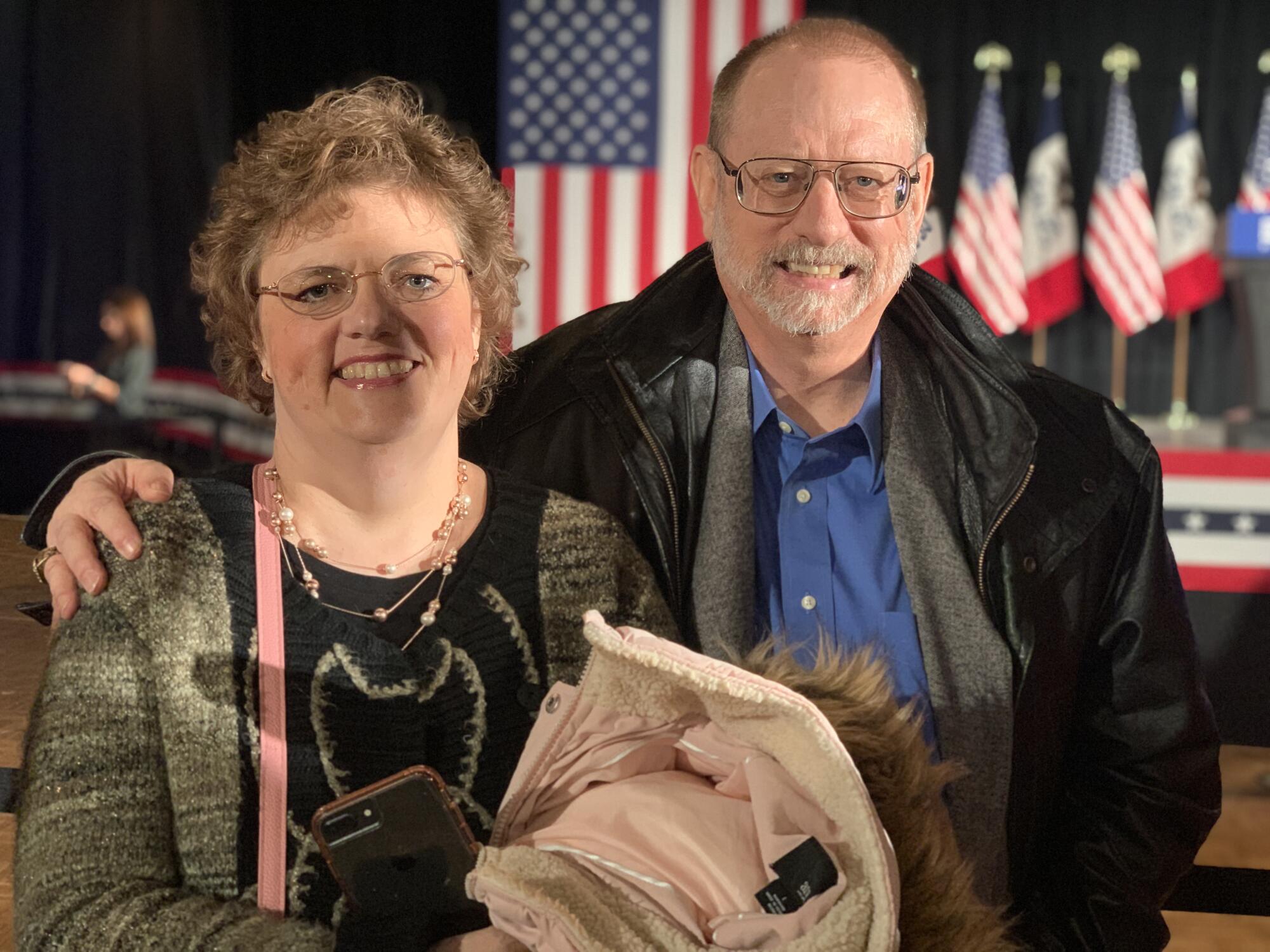
Bud Pettigrew, who attended Valentine High School with Walz and is a former Nebraska Democratic Party official, said he’s heard mixed reactions in the Cornhusker State to the vice presidential nod.
“The people who are Democrats or open-minded independents are all thrilled about Tim,” said Pettigrew, former Marine and high school teacher. “The MAGA-type Republicans, they don’t care. He’s just another liberal. Once you move away, you don’t count anymore. You hear this a lot from rural people.”
Pettigrew, 63, was a senior when Walz was a freshman quarterback on the junior varsity team. Pettigrew saw in Walz “a pretty tough kid who had some ability.”
Walz’s father was the school superintendent, and Pettigrew remembers him fighting for a school bond — not an easy feat in a fiscally conservative town — to replace the 1897 schoolhouse said to be haunted by the ghost of a student who died after someone poisoned her clarinet reed.
Pettigrew is planning to vote for Harris and Walz.
Darlene Meyer, who owns the Plains Trading Company bookstore on Main Street, said she “was frightened” when she learned Harris was running — not because she dislikes her, but because she figured too many conservatives would refuse to vote for her because she’s a woman, because she’s Black and Asian American, and because she’s from California.
“How many strikes can you have against you?” she said. Walz, she added, was a smart choice.
Meyer is a registered Republican but not a party-line voter. She does not like Trump and said it was frustrating that he politicized masks during the COVID-19 pandemic lockdown.
Meyer, a septuagenarian and longtime nurse, still requires masks in the bookstore, a 1914 building with poor ventilation. A few people have spit on the floor in protest. Others boycotted.
Still, Meyer tries to avoid discussing politics.
“There’s plenty else to talk about. The weather. Grasshoppers.”
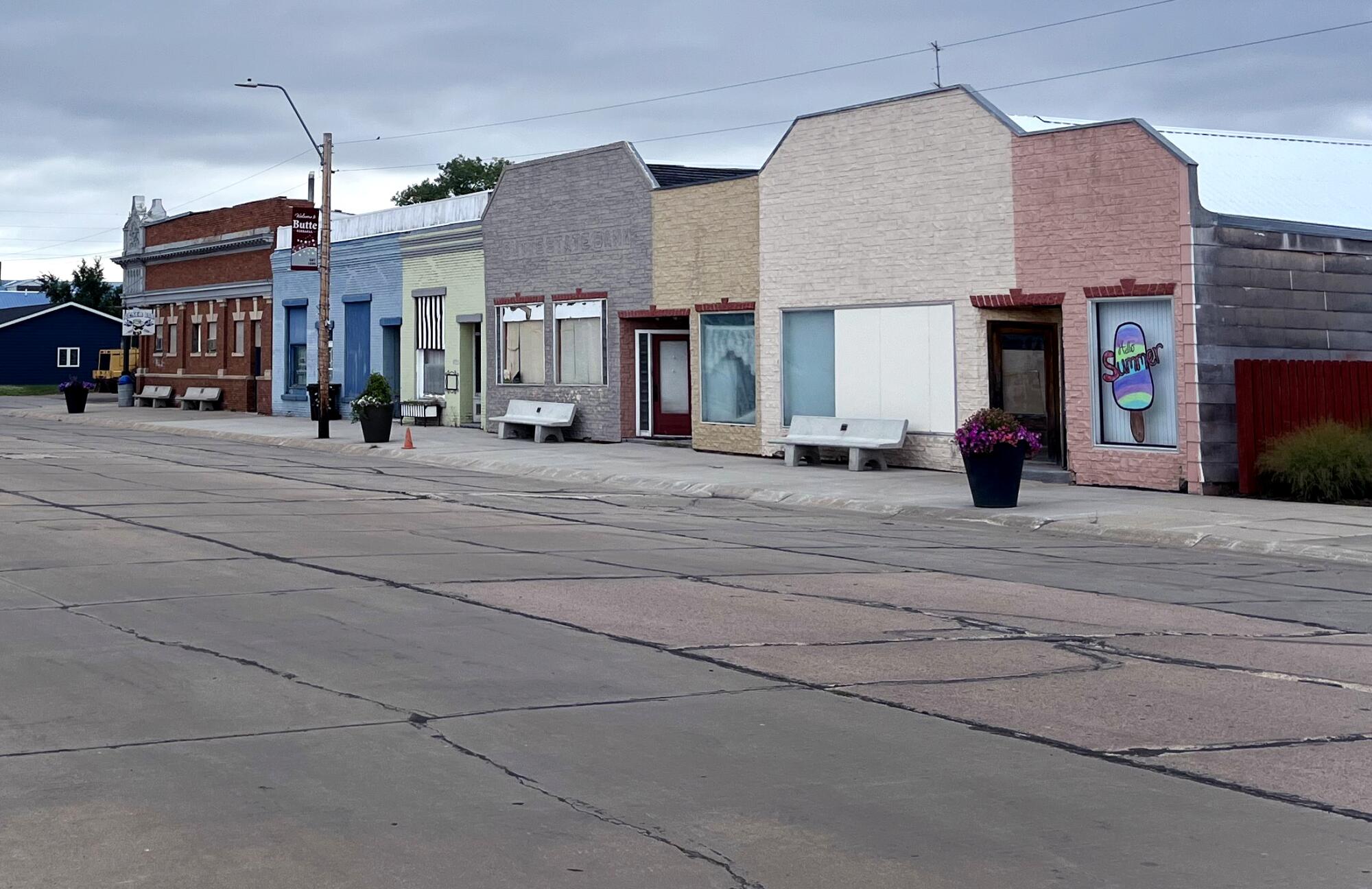
When he was a sophomore, Walz moved with his family 100 miles east to the farm town of Butte to be near relatives after his father was diagnosed with lung cancer. His dad died when he was 19.
Butte, which had a population of around 500 back then, has shrunk to about half that size. Butte High School — from which Walz graduated in 1982 among a class of 25 students — closed years ago. A fading mural downtown reads: “Save the Rural Schools.”
A Trump 2024 flag flies alongside the American flag next to the Butte Community Center.
Walz’s mother, Darlene, still lives in town, and some residents said that while they don’t agree with her son’s politics, they try not to talk about it because they don’t want to hurt her feelings.
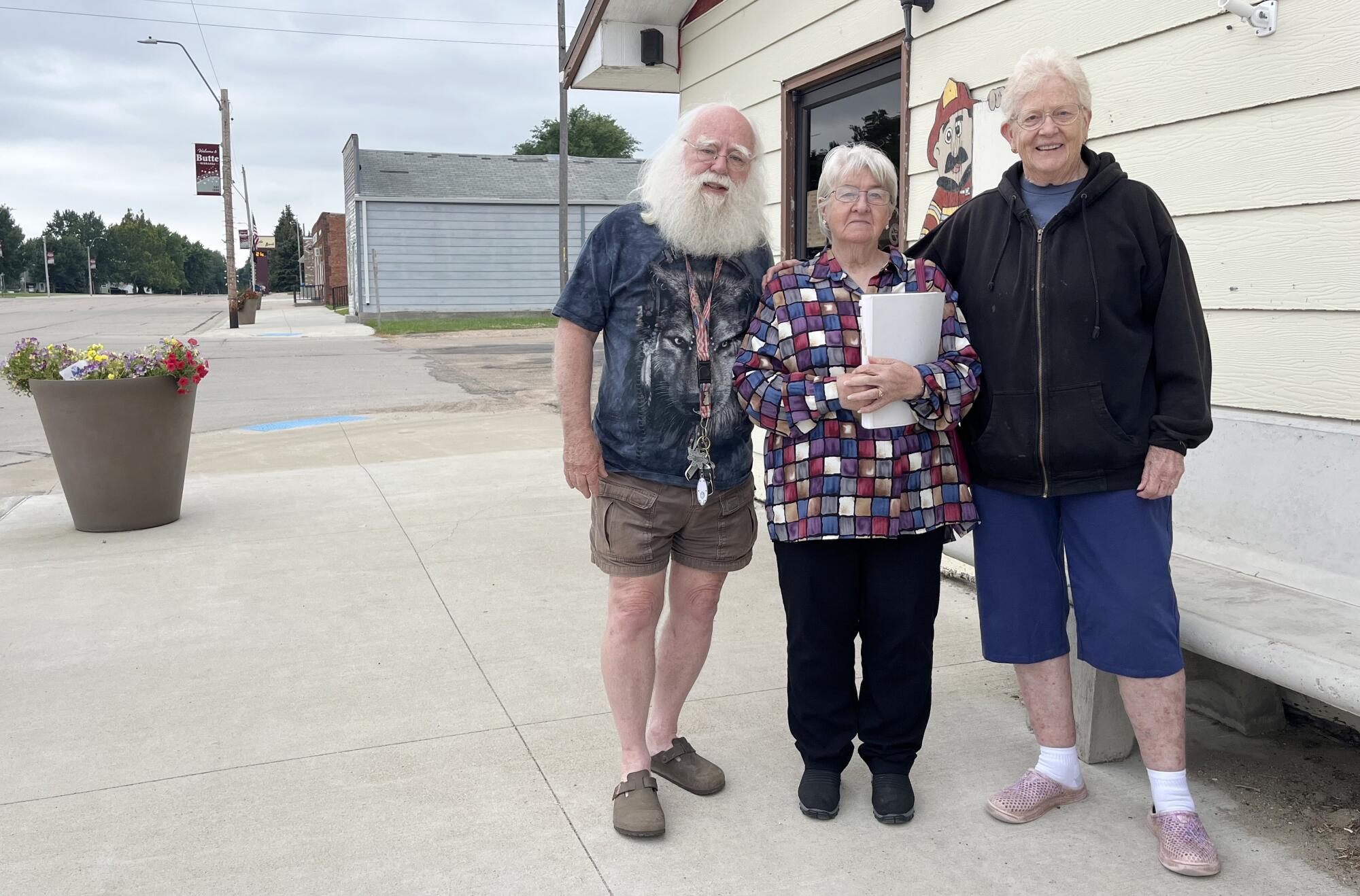
Dorothy Boes, a retired special education teacher who lives just over the South Dakota line, goes to church in Butte and is in a women’s coffee group with Darlene Walz.
Boes does not like the way Trump “talks about and bad-mouths women” and was outraged by the Jan. 6, 2021, insurrection. She worries about more potential violence.
“I just feel like he’s not going to go quietly into the night if he doesn’t win,” she said.
Boes, 77, does not know much about Walz’s political record. But she knows that he comes back to Butte often to take care of his mom and that he frequently brings her to Minnesota.
“Those are good, positive things, and, in my heart, I feel that he deserves a chance. And so does she,” Boes said of Walz and Harris. Boes is a longtime Republican who voted twice for Trump — but is undecided this year.
Richard Meadows, an 81-year-old “die-hard Democrat” who mows Darlene’s lawn, said he and his wife “coexist” peacefully with their Republican neighbors in Butte.
But Meadows — who has a chest-length white beard and worked for years as a professional St. Nick — knows who’s getting his vote.
“Santa Claus is gonna vote for Tim and Kamala.”
As for Valentine? Its post office gets inundated with packages every February by romantics who want a holiday-themed postmark. But the town is not named for St. Valentine.
It is named for Edward K. Valentine, a Union soldier during the Civil War and a congressman.
He was a Republican.
More to Read
Get the L.A. Times Politics newsletter
Deeply reported insights into legislation, politics and policy from Sacramento, Washington and beyond. In your inbox twice per week.
You may occasionally receive promotional content from the Los Angeles Times.










